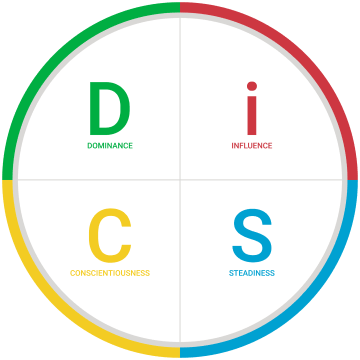Wiley Publishing’s Everything DiSC® framework recognizes D (Dominance) personality types as natural leaders who demonstrate exceptional problem-solving abilities and produce results through their commanding and confident leadership style. Their sharp focus and dedicated intensity enable them to lead teams through obstacles and achieve results when under pressure. The strength of D types can unintentionally suppress the needs of team members which leads to conflict during group efforts.

Everything DiSC D styles can strengthen their workplace relationships by blending patience and collaborative skills with their bold approach while paying attention to other people’s priorities. This article shows how D types can improve their leadership effectiveness through emotional intelligence and strategic restraint while maintaining their natural drive.
Everything DiSC D Style: Listen More Before Deciding
D types excel when they take quick and decisive actions based on their natural instincts instead of spending time on lengthy analysis. The quick progress achieved by their methods can exclude valuable contributions from those who prioritize data like C (Conscientiousness) styles or who seek consensus like S (Steadiness) styles. When D style decision-makers allocate time to listen before making choices they are not delaying progress they desire so badly, but instead they are improving their choices and the possibility of a successful outcome by incorporating varied viewpoints. A D type leader who takes a brief pause during a strategic meeting to invite or consider a team member’s alternative solution may discover a more effective strategy. D types who develop self-awareness about their impulse to act too quickly can enhance their decisions by leveraging others’ insights while maintaining their decisive nature.
Recognize That Emotions Matter in Business
Everything DiSC D styles prioritize achieving results over building relationships while viewing emotions as avoidable obstacles to effective performance. In contrast, the I (Influence) and S styles succeed through building connections because they see trust and morale as essential elements for their success. Understanding the importance of the important role emotions play can expand a D type’s influence and be a force multiplier rather than diminishing their control. For example, a D type team leader can show appreciation for the group’s hard work after a challenging victory instead of immediately shifting focus to the next target. Acknowledgement of team members’ emotional needs cultivates loyalty and lasting teamwork which drives continuous success. Self-awareness in this context involves recognizing the human elements behind tasks and connecting their motivation with relational consequences.
D types must identify moments to decelerate so they can meticulously work through important details.
Most D styles lead with speed but their drive for swift outcomes may cause them to miss important details which precision-focused C types or stability/process-oriented S types would notice. Strategic pauses can help maintain urgency while avoiding mistakes. A D type rushing to market can experience product failures due to untested flaws which could be avoided through short evaluative testing. D types who listen to their quick-action instincts all of the time are unable to determine when planning or precision should take precedence. They need to understand that speed without sufficient caution most often leads to disaster and by understanding requirements for meticulousness will protect their daring endeavors. Achieving this critical balance stops unnecessary corrective work and strengthens belief in their leadership.
Encourage Others Rather Than Just Critiquing
People with D styles find problems quickly and push others to improve which creates advancement but, it feels harsh and dismissive to I styles who need positive reinforcement or S styles who seek sincere appreciation. By combining encouragement with critique leaders can increase their influence without lowering their standards. By stating “You’ve got the skills to nail this—let’s tweak it” instead of “This needs to be better,” a D type blends challenge with appropriate support which becomes motivating to all styles. Self-aware people recognize their tendency to criticize before deliberately adding positive reinforcement which nurtures others’ recognition needs and supporting high performance standards.
Delegate More & Trust the Team
D-types feel most secure about success when they maintain direct control over tasks. In contrast, the C style excels through analysis and the I style excels through enthusiasm when they operate independently. Increasing delegation with descriptive expectations will allow D type leaders to concentrate on larger objectives while maintaining accountability and empowering their teams to succeed. When a D type leader assigns a task to a skilled team member and stops micromanaging, they will marvel at the unexpected and amazing results. When D types pause to reflect on their need to control every facet of work, they care better able to utilize team members’ strengths which are often complementary to their own. This achieves both team ownership satisfaction and enhanced collective success.
The Takeaway: Drive Meets Adaptability
D styles excel in leadership and problem-solving to produce outstanding results yet their workplace interactions can reach new heights when they meld their intensity with sensitivity to others’ priorities. The practice of quiet listening before making decisions demonstrates respect for the C personality type’s focus on detail while honoring the S personality type’s need for inclusivity. The recognition of emotions matches the I personality’s warmth with the S personality’s harmony. The energy of the I style grows stronger when they support others while simultaneously boosting the morale of S types which is a lesson D styles should take heed of. Delegating empowers every style’s unique contribution and leverages their innate strengths. The modifications don’t suppress D type’s intensity but redirects it by combining their driving nature with patience and teamwork.
When D styles develop stronger self-awareness by learning to manage their impulses and respond to others they transform from aggressive drivers into motivational leaders. The power of their confidence becomes a resounding force when combined with emotional intelligence and strategic restraint. In diverse work environments D types who harmonize their assertiveness with flexibility become team transformers who generate enduring and audacious successes.


